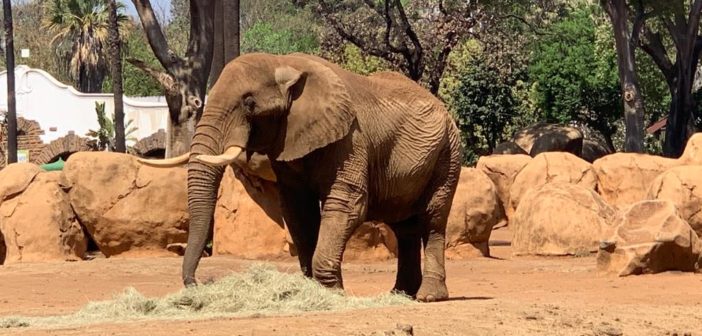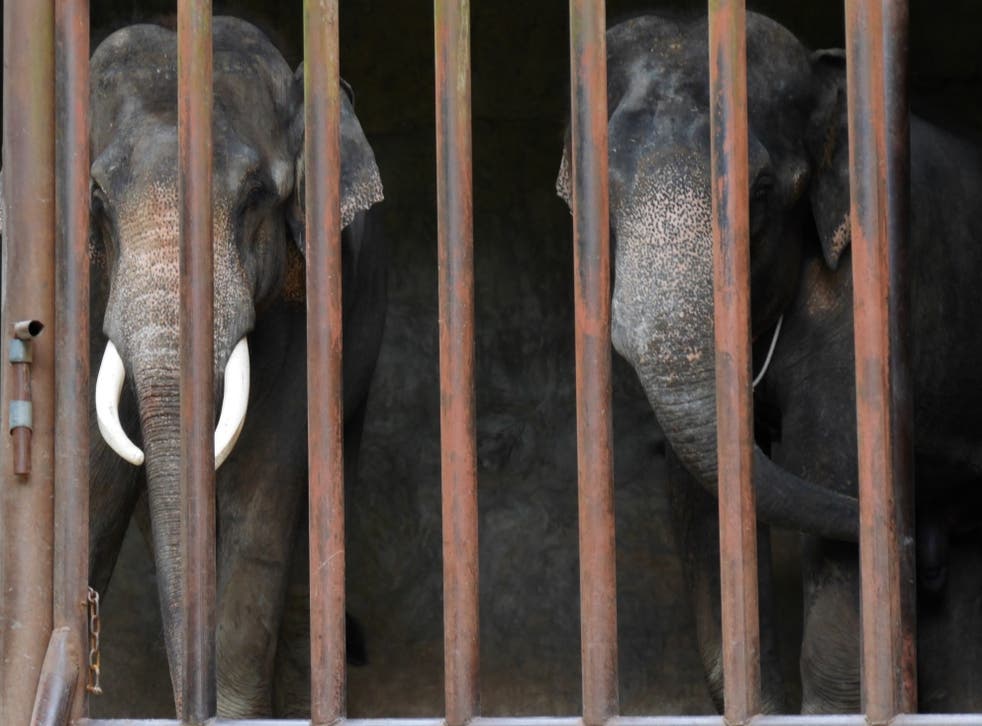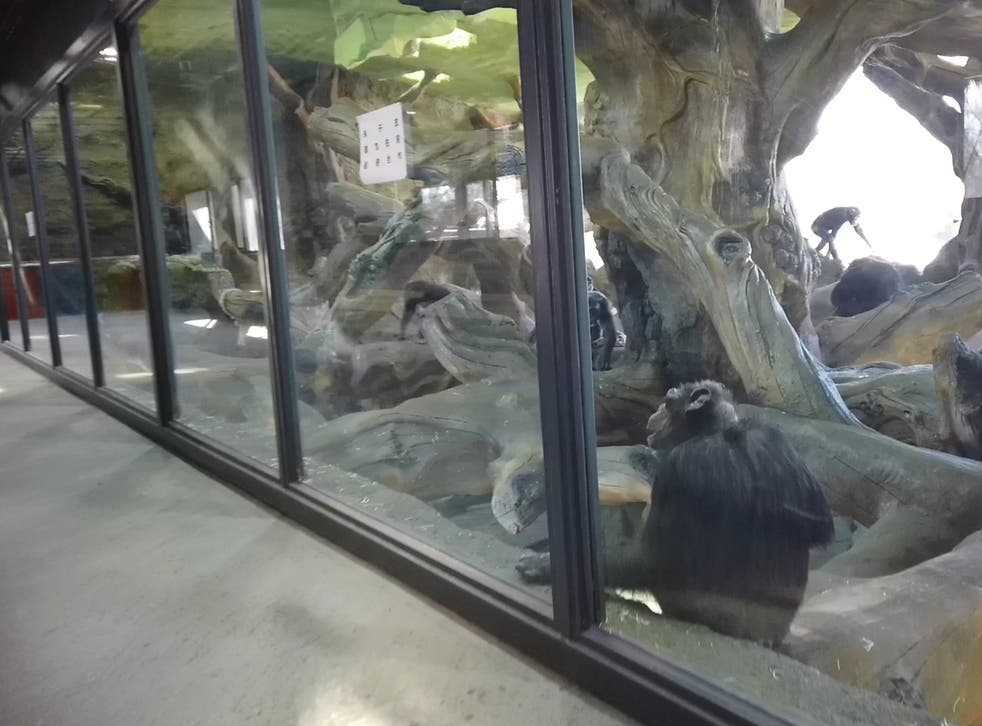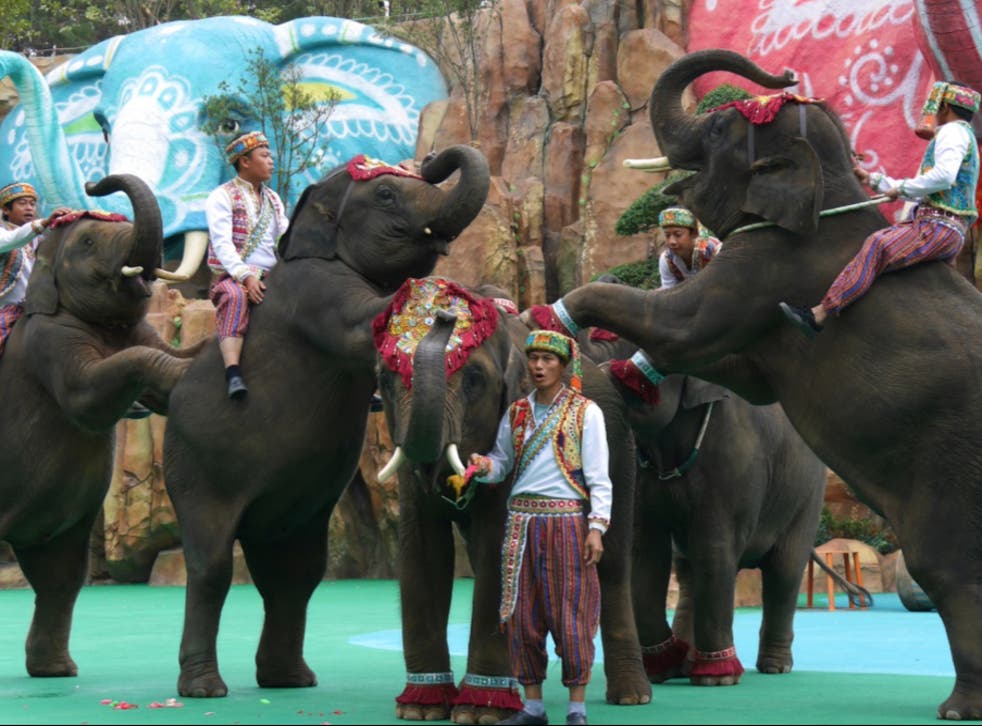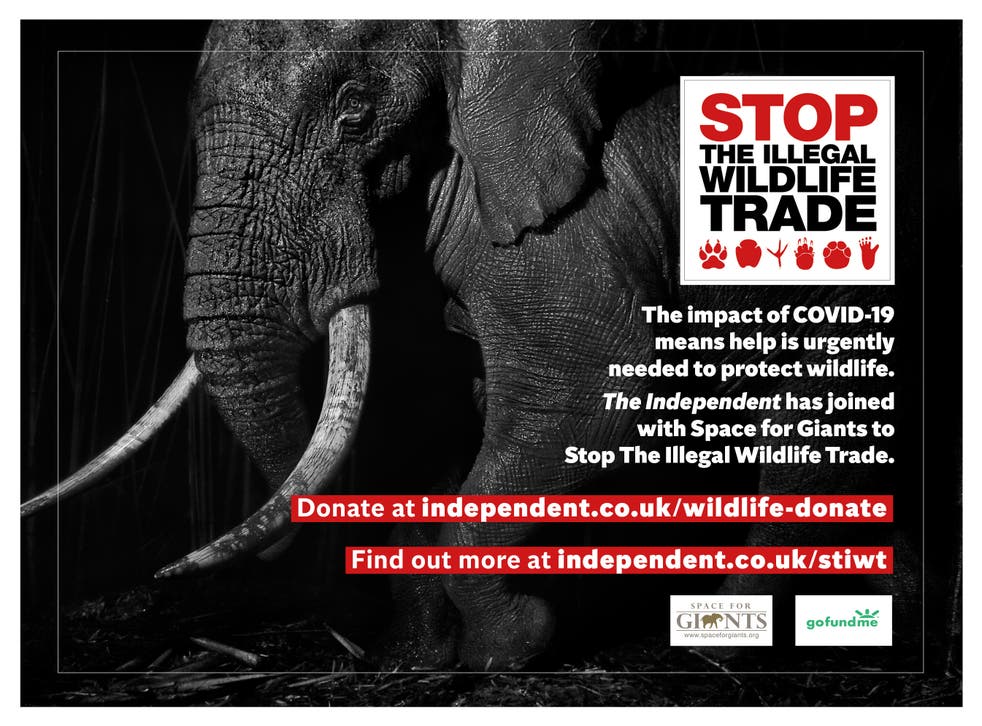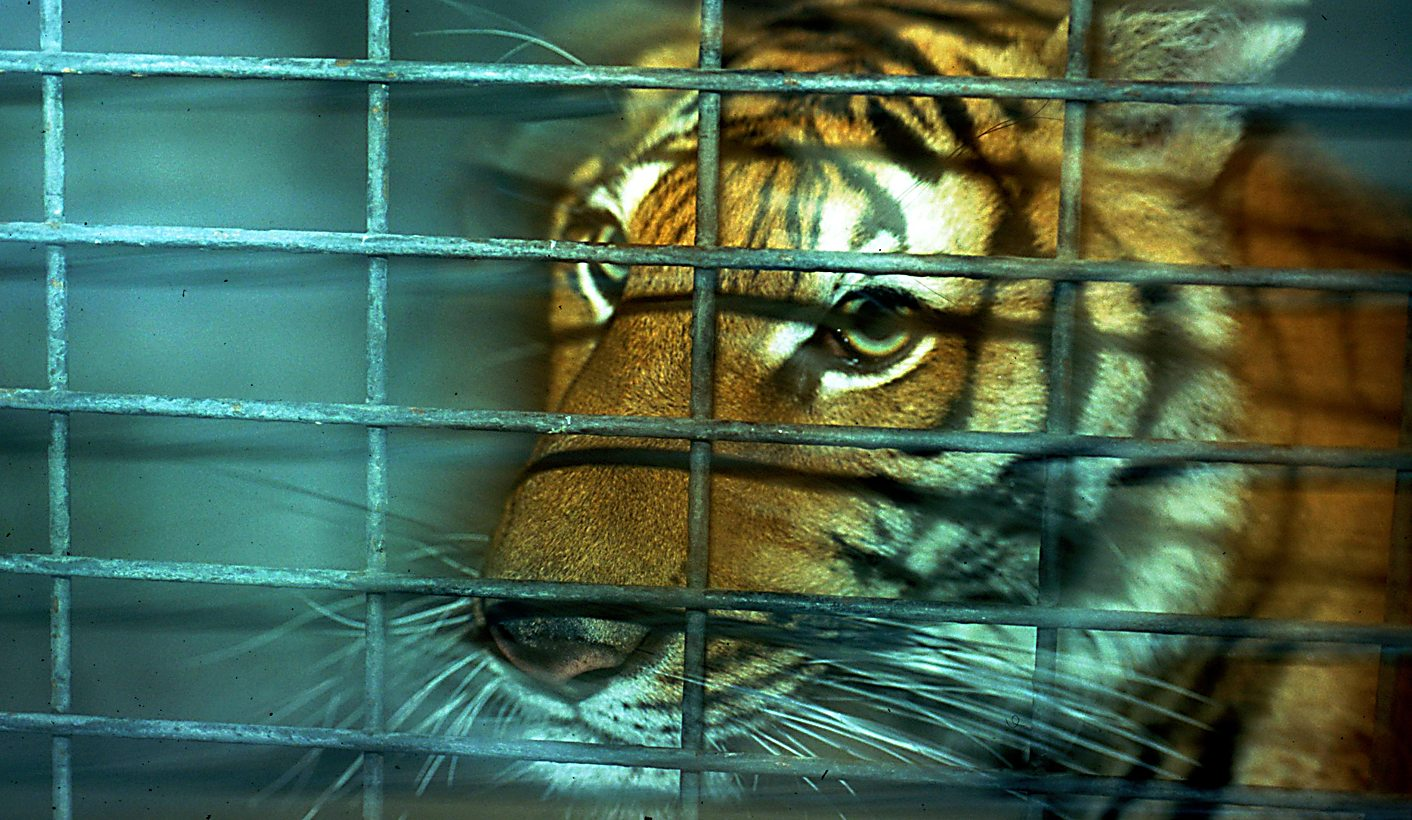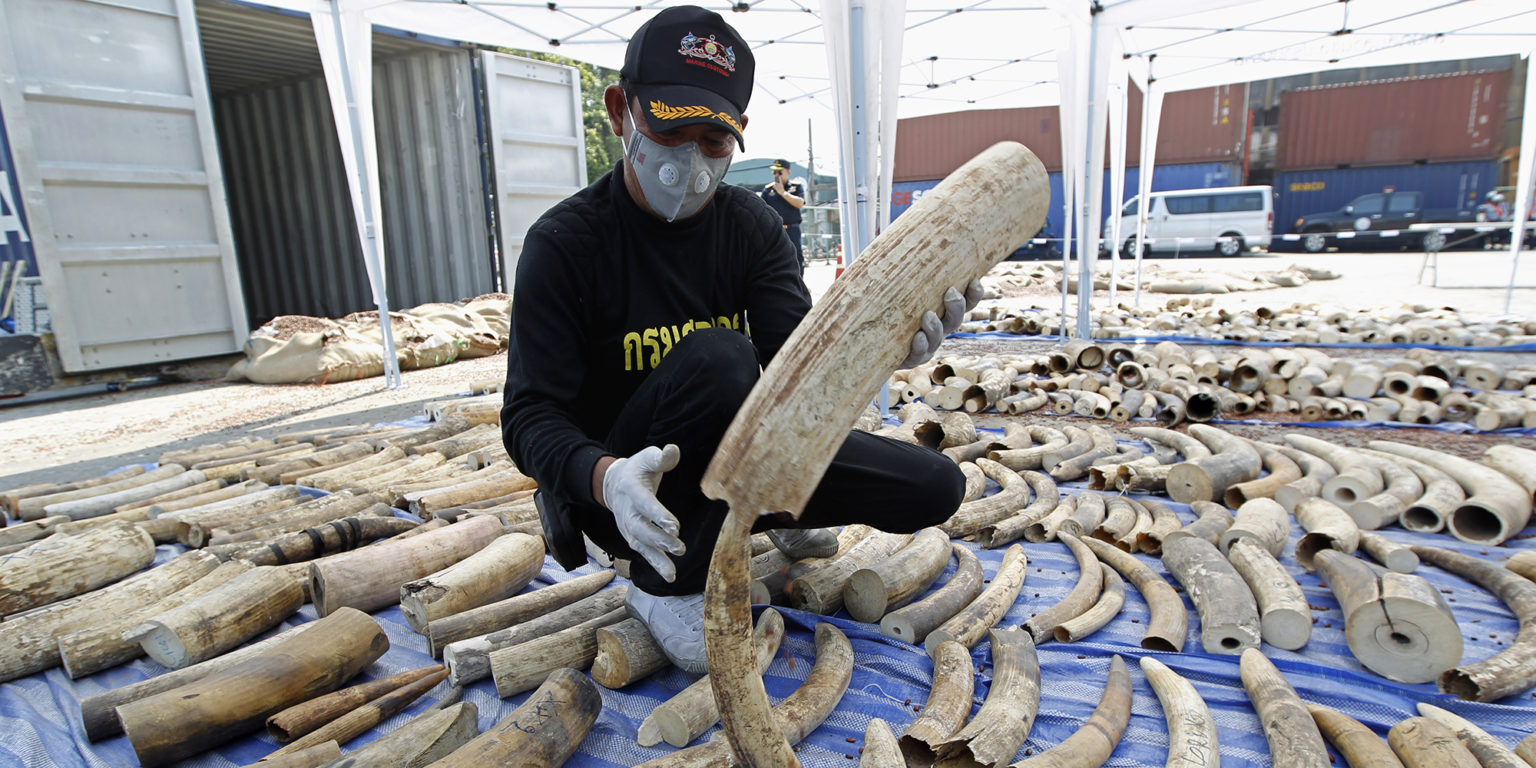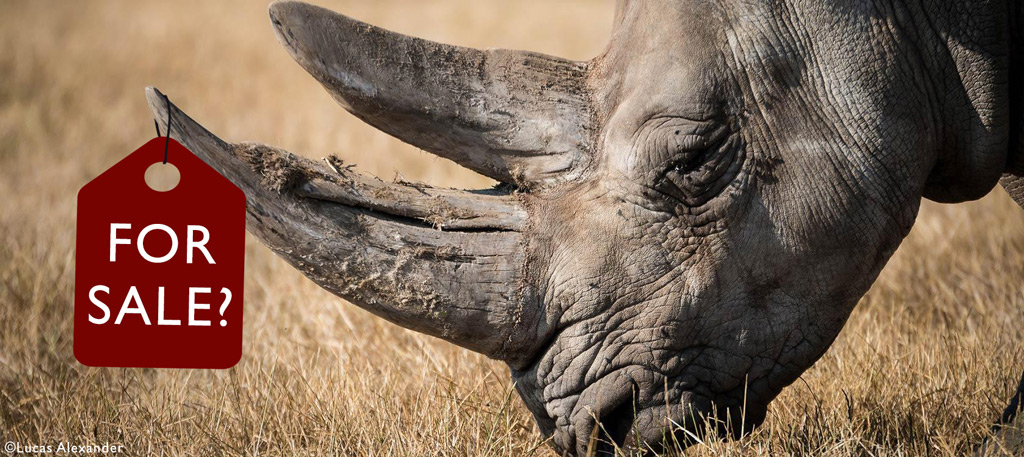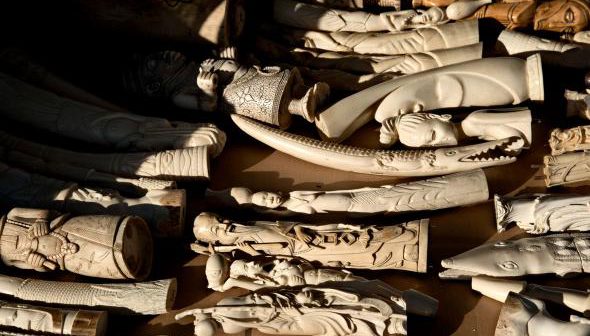
These seized ivory trinkets were crushed in 2015 in Times Square, in New York City. The hope is that destroying ivory will help put an end to elephant poaching. Photograph by Kate Brooks, Redux
The black-market trade in wildlife has moved online, and the deluge is ‘dizzying’
BY RENE EBERSOLE - 18TH DECEMBER 2020 - NATIONAL GEOGRAPHIC
llegal wildlife ads have increased on Facebook despite its steps to combat animal trafficking. Crime watch groups are calling for broad legal reforms.
WHEN A SQUAD of federal and state law enforcement agents with guns and bulletproof vests entered a single-story brick home in Buffalo, New York, on July 5, 2018 they were searching for business records of a suspected criminal enterprise.
Experts trained to handle dangerous exotic cats congregated in a sunroom pungent with the odor of cat urine. Wearing blue latex gloves, the wildlife handlers carefully collected two young caracals distinguished by their long, black-tipped ear tufts; four juvenile servals, copper-colored with handsome black spots; and an adult savannah cat, a cross between a serval and a house cat. The homeowner, Christopher Casacci, 38, a short man with buzz-cut black hair, watched as the handlers hauled the cats away in plastic carriers to a truck outside, protesting that the savannah cat, named Tigger, was his family’s pet.
Casacci, who was running the website ExoticCubs.com, is now facing 33 charges related to trafficking protected African cats for the exotic pet trade, including disguising illicit activity by falsely declaring some of the animals as domesticated breeds, and violating a federal animal welfare law.
The unauthorized trade in protected wildlife not only violates landmark U.S. environmental laws but also the Convention on International Trade in Endangered Species of Wild Fauna and Flora (CITES)—a global agreement that seeks to ensure that trade in wildlife and plants doesn’t threaten their survival.
If convicted, Casacci could face as much as $1.3 million in fines and up to life in prison, according to federal attorneys prosecuting the case.
This is not Casacci’s only run-in with the law. Previously, he served five years on probation for felony forgery of drivers’ licenses that he was selling online, complete with scannable barcodes and ultraviolet watermarks.
His attorneys, James Grable, Jr., and Nicholas Romano, declined to make him available for an interview for this story but provided a statement saying that Casacci, who was then 21 at the time, and therefore much more mature now, “admitted this was wrong, accepted responsibility for his conduct, and received a sentence of probation,” which he served.
In May 2020, Casacci made the news again. Federal agents searched his Sunbeam Laboratory facility, in Lockport, New York, which made hemp products before the COVID-19 pandemic, when he retrofitted his operations to mass manufacture hand sanitizer. The authorities allegedly seized more than 22,000 mislabeled and substandard KN95 masks and a thousand unauthorized COVID-19 test kits imported from China. No charges have been filed in relation to the alleged seizures. The company has denied wrongdoing.
In their statements relating to Casacci’s cat trafficking case, his attorneys called him a “lifelong animal lover” and “not a poacher, trafficker, or abuser of animals.” They say that he embarked on his exotic cat business as an effort to rescue African kittens and place them in sanctuaries. According to them, “Casacci made every effort to follow the law and the guidance given to him by state and federal governmental officials, and as a result Mr. Casacci maintains that he is not guilty.”
Casacci may have caught law enforcement’s attention, but countless other online wildlife dealers continue to operate in plain view, experts say, because of a law that protects online companies from being accountable for illegal activity on their platforms.
The internet is now a global bazaar for the multibillion-dollar black market for exotic pets and animal parts, used for everything from curios and medicines to leather boots and skin rugs.
“We have a dizzying array of platforms where all kinds of trade is going on, often with the illegal masquerading as legal,” says Craig Tabor, former special agent in charge of the U.S. Fish and Wildlife Service’s intelligence unit, now serving as the agency’s international attaché in Gabon.
“Criminals in the U.S. can communicate with people in China, Tanzania, and Indonesia in real time, and anonymously,” he says. “They’ll use any platform available, and they will adjust their methods to evade detection, like switching terminologies and using code words.”

Illicit online trade in exotic species is a significant threat to wild birds such as the African grey parrot (left) and blue-and-yellow macaw (right). The birds are sold to brokers, who in turn offer them for hundreds, even thousands, of dollars on the international black market. In a recent 15-month survey of an Algerian e-commerce platform, researchers found nearly 270 ads illegally offering more than 560 African grey parrots for sale, most captured in the wild.PHOTOGRAPH BY WORLD ANIMAL PROTECTION
Crime watch groups have focused heavily on Facebook, with 2.6 billionmonthly users in dozens of countries and an expanding portfolio of former competitors, including Instagram and WhatsApp. (The purchase of those companies prompted federal regulators in early December 2020 to accuse facebook of illegally crushing rivals to monopolize social media. Facebook is pushing back on the allegations, saying the government “cleared the acquisitions years ago” and now “wants a do-over,” according to reporting by CNN Business.)
Facebook says it’s cracking down on wildlife trafficking by working with conservation groups to remove endangered animal postings. But some online crime experts say such policies of removing illicit wildlife for sale may be doing more harm than good. They say it prematurely alerts criminals that they’ve been spotted, creating a game of whack-a-mole in which traffickers open new accounts under different user names. And they assert that it deletes public evidence that could help authorities catch traffickers.
Facebook may be acting with good intentions. But even if that’s the case, a number of groups, including the nonprofit Alliance to Counter Crime Online (ACCO) and the National Whistleblower Center, a nonprofit that supports people who expose illicit activity, are calling for broader measures to combat cyber wildlife trafficking.
Facebook under fire
A new report by ACCO found that the number of Facebook pages and groups devoted to the trade in endangered species and their parts has grown since the company pledged to halt such sales in 2018.
The finding parallels other recent research showing widespread illegal wildlife trading on Facebook, including a study by the World Wildlife Fund reporting that during the five-month period ending in May 2020, researchers counted more than 2,000 wild animals from 94 species for sale on Facebook from Myanmar alone.
The ACCO investigators searched Facebook for 17 common word combinations associated with the illicit wildlife trade, such as “rhino horn for sale,” in four languages: English, Arabic, Indonesian, and Vietnamese. They found that more than half the 473 pages and 281 groups (representing nearly 1.5 million users) identified as selling endangered wildlife were created during the past two years.
A Facebook spokesperson did not respond to questions about the allegations made by ACCO or other groups but provided a statement about the company’s policies: “We prohibit ads and content attempting to trade, sell or purchase endangered animals, and remove content that violates our policies when we’re made aware. In addition to proactive detection, and partnerships with wildlife experts, we progressively work to improve our enforcement of our policies and respond to valid requests from law enforcement when they are made.”
In addition, the spokesperson said there is a new feature being launched on the company’s platform this month that will inform users about the illegal trade when certain wildlife-related search words are entered. “For example, if a user were to search for a protected species combined with a commercial activity such as ‘tiger + buy,’ an alert would pop up to declare that animal abuse and the sale of endangered animals or their parts is not allowed on Facebook.”
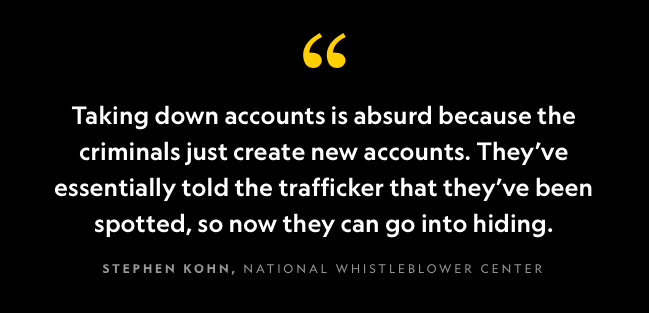
Facebook’s dominance over the internet constantly grows as the company’s algorithms make recommendations to connect users with people and groups who reflect similar interests.
“That matching is scary when people are trading illicit goods,” says Gretchen Peters, founder of ACCO, which works to fight organized crime networks trafficking everything from guns, drugs, and people to tarantulas, parrots, rhino horn, and human body parts. “If it’s illegal to do something in real life, it should be illegal to host it online,” she says.
“Governments need to enact legislation that compels social media firms to modify their algorithms to [better]detect illegal activity instead of facilitating it,” says Dan Stiles, a Kenya-based illegal wildlife trade investigator working with ACCO. “Facebook and other technology firms are sophisticated and rake in billions in annual revenue. They’re more than capable of combating the crime on their platforms, but there’s nothing in the law that requires them to do so. That needs to change.”
To that end, the ACCO and the National Whistleblower Center favor changing a 1996 law that exempts tech companies from legal responsibility for many crimes committed using their platforms. They’re also promoting passage of a new wildlife conservation and anti-trafficking law, now in the U.S. Congress, that would provide the ability for any person anywhere in the world—including employees of big tech companies—to anonymously and confidentially report animal trafficking and be rewarded financially for doing so.
The groups say that making companies more accountable for criminal activities on their platforms will require them to work more closely and cooperatively with law enforcement. Then, instead of catching one wildlife trafficker at a time, they can shut down entire criminal networks operating on the internet.
Casacci is the only person indicted so far in relation to his online exotic cat business, according to federal attorneys. Court documents allege that he launched ExoticCubs.com about three years ago, advertising serval and caracal kittens imported from South Africa for $7,500 and $10,000 respectively. The full-grown, 20- to 50-pound felines make “excellent pets,” the website stated.
In addition, it said, exotic cats can be trained to use the toilet, and it advised not to mistake the caracal’s hiss for aggression—it’s their “version of meow.” Kittens were available, the website said, for curbside pickup at Buffalo International Airport, or Casacci would drive them to within a several-hour radius of the city. He also advertised that he offered rescue services for unwanted large felines, including cheetahs, tigers, lions, panthers, and jaguars.
Between January and June 2018, Casacci imported 30 African wild cats, including 18 caracals and 12 servals, from a captive breeder in South Africa, according to court documents. Federal authorities claim that he violated the Lacey Act, which bans the illegal trade of wildlife and plants, and animal welfare laws.
A grand jury indicted him with selling 17 of the cats to buyers around the country, with falsely labeling four of them as domestic hybrids, and with 15 counts of inhumane treatment of animals. Five cats are unaccounted for in public records. ExoticCubs.com has gone dark, but photos of cats for sale that Casacci posted in 2018 are still accessible on social media.
In the print media world, if a newspaper runs a libellous story about someone, that person can sue the outlet. But they can’t sue the newsstand or coffee shop that sold the paper. If they could, few businesses would ever risk selling newspapers, especially those that run stories critical of individuals or detail malfeasance.
Similarly, an “interactive computer service,” according to Section 230 of the Communications Decency Act, can’t be “treated as the publisher or speaker of any information” provided by an outside party. So if someone defames a former partner or sells illegal goods on Facebook, that person, not Facebook, is held responsible.
A ‘sword and a shield’
Upon passage of the bill, one of its sponsors, Ron Wyden, a Democratic senator from Oregon, described Section 230 as providing a “sword and a shield.” The sword would enable technology firms to self-police content on their platforms as they saw fit. The shield would provide sweeping immunity from liability for content posted by third parties.
“As it turned out,” Stiles says, “the sword was made of rubber, while the shield was Teflon.” Stiles is among the many critics who say tech companies are abusing the shield.
The companies are fighting mounting efforts by legislators to reform the safe-harbor protections of Section 230, arguing that their self-policing of content such as illicit sales of wildlife and wildlife products, guns, drugs, and humans is effective.
Since 2018, more than 30 international tech, e-commerce, and social media companies have joined with conservation groups to form the Global Coalition to End Wildlife Trafficking Online. Members include Facebook, eBay, Google, Twitter, and WeChat owner Tencent. The coalition is led by the World Wildlife Fund (WWF), Traffic (a wildlife trade monitoring group), and the International Fund for Animal Welfare.
The goal: To reduce cyber wildlife trafficking by 80 percent by the end of this year. Peters and other experts, however, question the very premise of that goal, saying it’s impossible to quantify wildlife trafficking online because deals are so often made in secret.
The coalition’s most recent progress report shows that as of March 2020 more than three million endangered species listings have been removed from the internet as a result of companies sharing data with wildlife experts, enhanced algorithms, monitoring of key word searches, and intelligence sent through volunteer citizen “cyber spotters.”
Emilie Van der Henst, a wildlife trafficking project manager with WWF and Traffic in Brussels, Belgium, praises Facebook in particular for removing suspicious content. “They have taken a large step by saying they ban all animal trade unless it comes from a qualified merchant,” Van der Henst says. “As soon as we find [animal]listings, it takes a maximum of two weeks for Facebook to take them down.”
But others say that closing accounts and deleting posts does more harm than good. “Taking down accounts is absurd because the criminals just create new accounts,” says Stephen Kohn, an attorney with the National Whistleblower Center. What’s more, he says, deleting accounts may erase crucial evidence that could be used to find and prosecute criminals. “They’ve essentially told the trafficker that they’ve been spotted, so now they can go into hiding. How nice to be a criminal, and every time I’m about to get caught, a big company warns me, then scrubs all the [public]evidence.”
The law enforcement authorities I spoke with did not want to go on the record about how Facebook works with them on their investigations. They did say it’s helpful when tech companies alert them when there’s illicit trading going on and make evidence available when requested.

In response to the Whistleblower Center’s accusations, a Facebook spokesperson referenced the company’s operational guidelines for law enforcement indicating that it has the right to disclose account records when provided with a subpoena, court order, search warrant, or national security provision.
Patricia Tricorache, a Mexico City-based independent wildlife detective, who tracks criminals selling cheetahs online and works with the ACCO, says alerting tech companies about trafficking on their sites has derailed some of her investigations. It’s her impression that “if you report it, they either ignore you, or they remove everything,” she says. “Then I lose the guy, and he just opens another account with a different username.”
At present, Tricorache is following about 550 online accounts, 80 percent of them on Instagram, that “together have offered well over 2,000 cheetahs for sale in the last 10 years.” (Scientists estimate that there are only about 7,100wild cheetahs left worldwide.)
Whistleblower charges
The National Whistleblower Center claims, according to a complaint provided confidentially to the Securities and Exchange Commission (SEC) in 2017, that Facebook is facilitating illegal activity on its platform, making money through advertisements generated by algorithms, and not disclosing the risk of such conduct to company shareholders—in violation of SEC regulations.
“In all its required SEC filings and communications with shareholders and potential investors since its initial public offering on May 18, 2012,” the complaint states, “Facebook has violated numerous securities laws and regulations by failing to disclose the revenue it has derived from and the massive risks it faces because of rampant illegal trafficking it has allowed to occur on its products.”
In collecting evidence to support their claim, the Whistleblower Center got some help from two anonymous former law enforcement agents who logged onto Facebook and created phony profiles representing themselves as ivory dealers. After dressing up their profiles with photographs from safari trips to make them look like authentic ivory traders, they sent friend requests to suspected wildlife traffickers in Vietnam, a major hub of the illegal trade. Then they joined Facebook groups where those individuals were active. Since they didn’t speak Vietnamese, they used Google translate to type words such as ngà voi and sừng tê giác, ivory and rhino horns.
Before long, the former agents had infiltrated a network of hundreds of ivory traffickers eager to buy their merchandise. As they fielded messages from customers such as a user in Ho Chi Minh City, Vietnam, who wrote, “Hello I want buy ivory of you.” They also took screenshots of products offered for sale on Facebook, from elephant ivory bracelets and rings trimmed in 14-karat gold to intricate happy buddha ivory carvings, whole rhino horns, and tiger fang pendants.
Many of the postings were adjacent to auto-generated advertisements for a wide range of multinational companies, including fast food chains, major league sports teams, auto sellers, airlines, technology corporations, shoe brands, retail stores, and military equipment.
“It would have been difficult for Congress to fathom how far the internet would evolve over the 20 years since Section 230 was enacted,” reads the complaint, “and nearly impossible for it to imagine that a company such as Facebook would be worth billions of dollars, with nearly all its revenue coming from advertisements, a good portion of which appear directly alongside illegal trafficking content.”
Kohn says he was shocked when he first realized the “massive amounts of illegal activity happening on Facebook” and how much the company must be benefiting financially. “It’s unbelievable,” he says. “How can a publicly traded multibillion-dollar corporation for which investors are making billions of profits be so deeply involved in illegal wildlife?”
The SEC declined to comment on the whistleblower complaint.
A Facebook spokesperson responding to questions about the whistleblower charges reiterated the company’s policies and participation in the Coalition to End Wildlife Trafficking Online to prohibit content attempting to trade endangered species.
The recent report by the Alliance to Counter Crime Online concludes that Facebook “is not just failing at removing wildlife sale pages and groups, it’s succeeding—massively—at pointing users in their direction,” illustrated by the finding that nearly 30 percent of the pages that they found trading wildlife were located through the platform’s “related pages” feature, which uses algorithms to recommend pages similar to ones that users have visited or liked in the past.
Facebook did not respond to requests for comment about the ACCO report, other than to provide a statement on the company’s policies.
Peters says it’s her impression that the nonprofits steering the Coalition to End Wildlife Trafficking Online are “bending over backwards to paint the program as a success when it’s been anything but that.”
Leaders of the coalition did not agree to be interviewed about such accusations. Instead, they provided a statement summarizing the coalition’s goals, including “to harmonize prohibited wildlife policies, train staff to better detect illegal wildlife products, enhance automated detection filters, and empower users to be a part of the solution.” Among the victories cited was Facebook’s 2019 decision to ban trade in all live animals except those from verified sellers and all products from the most endangered species of animals and plants.
New crime-fighting tools
A report released in July 2020 by Traffic counts more than a dozen emerging tools for spotting illegal species for sale online. Using the same image recognition technology that identifies your photograph in a friend’s Facebook post, the programs search platforms for pictures of threatened species.
One such tool is software called ChimpFace being developed by Conservation X Labs, a Washington, D.C.-based company focused on wildlife preservation. It uses hundreds to thousands of photos of individual chimps with different face angles and in varied lighting to train the algorithm to recognize them. The more photos are uploaded, the more accurate the algorithm.
“It has huge potential,” says ape trafficking investigator Stiles. “ChimpFace can match chimp faces within a probability of more than 90 percent, but the app still needs to be perfected before it’s ready for use by law enforcement.” And even then, he says, tech companies will need to agree to use it.
David Roberts is a wildlife trade expert at the University of Kent, in Canterbury, England, who worked with a colleague to create an automated data mining system capable of detecting raw ivory for sale on eBay based on distinctive cross-hatchings known as Schreger lines. Roberts says the tool has an accuracy rate of 93 percent.
His investigations have revealed that most wildlife traffickers don’t hide their criminal activity on the so-called dark web, networks that require special software or authorization to access, or use the obvious ivory search terms. That’s why visual detection tools like the one he developed can be a major asset. Roberts says that when he shared the algorithm research with the company, “initial interest” quickly fizzled.
An eBay spokesperson, Erin Dodds, responded to questions about why the company did not adopt the technology by lauding eBay’s proprietary wildlife trafficking detection system. “In 2017-2019 alone we removed or blocked over 265,000 listings for items prohibited under our animal products policy,” she said.
In 2016, the National Whistleblower Center created an award-winning online platform that enables people around the world to anonymously file reports of wildlife crimes to authorities and qualify for financial rewards if their information contributes to successful prosecutions. Now the organization is advocating for passage of the Wildlife Conservation and Anti-Trafficking Act, which would strengthen enforcement by establishing wildlife violations as offenses under federal racketeering and anti-organized crime laws and would provide financial incentives and protections for whistleblowers.
Kohn’s hope is that if the act is passed (in combination with reform of Section 230), Facebook employees encouraged by the opportunity to receive a financial reward for credible intelligence exposing wrongdoing will become anonymous whistleblowers.
Masquerade
While judges, lawyers, and legislators are weighing whether to change landmark laws and enact new ones, wildlife detectives are spending long hours lit by the glow of their computer screens as they follow the endless labyrinth of links from one suspicious post to another. Tricorache says that sometimes dealers masquerade as conservation organizations or animal rescue operations in attempts to navigate around laws and permitting requirements.
In fact, Casacci’s claim of being a humane society was what caught the eye of law enforcement in the first place.
In early June 2018 Birgit Hutchcroft, a licensed exotic cat breeder in Tampa, Florida, was scrutinizing the terms of a deal with Casacci to buy two caracal cubs for $11,000. New York State, where Casacci lives, bans breeding and dealing wild cats (except hybrids that are at least four generations removed from the wild), considering them a danger to people and native wildlife. When Hutchcroft asked him about this, he sought to reassure her, she says, telling her that exotic cat sales are legal if the business is incorporated humane society: “As we place cats in shelters, we are covered under that aspect of the law,” he wrote in an email included among the court documents.
Hutchcroft forwarded the email to a contact at the USDA, asking if he could check Casacci’s license. “Just not sure if his credentials are sufficient,” Hutchcroft wrote. “Having second thoughts.”
In fact, Casacci’s license application to possess African cats had been denied in November 2017. Casacci withdrew an application with the USDA before it was complete, according to an email between two agency officials.
The agency dispatched an inspector, and when she arrived at his house on June 22, 2018, she found eight caracal and serval kittens in the sunroom and a “very strong odor distinctly different from the normal smells of this species,” according to her report. One serval kitten in a crate appeared lethargic, with watery eyes and diarrhea. She recommended that it be taken to a veterinarian as soon as possible. She also noted that the animal and another serval, both between nine and eleven weeks old, were so thin that they had protruding hip bones, concave abdomens, and palpable ribs, likely from malnutrition.
By the time authorities searched Casacci’s home almost two weeks later, two emaciated serval kittens had died of sepsis, according to the Cornell University necropsy report.
In a statement, Casacci’s attorneys say that “all of the kittens in his care were provided proper nutrition. Upon their arrival from South Africa, however, a small number suffered from undiagnosed health issues which Chris attempted to identify and treat with a veterinarian. It is important to note that the government has not charged Mr. Casacci with abusing or neglecting any animal, and has not charged him related to the condition of the animals in his care.”
Wildlife experts with the nonprofit group World Animal Protection and two private rescue organizations agreed to provide homes for the remaining six kittens and Tigger the savannah cat.
Tanya Smith, president and co-founder of Turpentine Creek Wildlife Refuge, in Eureka Springs, Arkansas, helped with the rescue at Casacci’s house. She took Tigger and the two smallest servals, now known as Sammy and Enzo, to her sanctuary. The servals were in bad shape, she says. “They had metabolic bone disease from poor nutrition, low blood calcium, parasites, ringworm, giardia, and coccidiosis. They were just barely alive, and we were really concerned that they wouldn’t make it.”
Lynda Sugasa, Founder of Safe Haven Wildlife Sanctuary, in Imlay, Nevada, took the remaining cats there. Servals Reina and Goya and caracals Hantara and Sorcha now live together in a 5,000-square-foot enclosure with heated dens for winter, multilevel climbing platforms, pools, and trees. “It’s nice to see them under the foliage grooming each other,” Sugasa says. But, she adds, they’re anything but domestic. “These are wild animals. They’ll always have those instinctual behaviors to bite and scratch. You can’t tame them.”
Sagasa and Smith are promoting the Big Cat Public Safety Act, which lists more restrictions on the possession and exhibition of exotic cats, including no direct contact with the public.
If Casacci is convicted, it will be a victory for authorities tracking alleged online wildlife traffickers. As of this writing, evidence of Casacci’s cat business is still visible on Instagram. Sandwiched between videos of him skydiving from helicopters and driving a red Tesla, more than a dozen 2018 posts show exotic kittens for sale. Some commenters gushed, “I want one!” Others queried: “How much?”
Original article: https://www.nationalgeographic.com/anim ... ife-trade/



